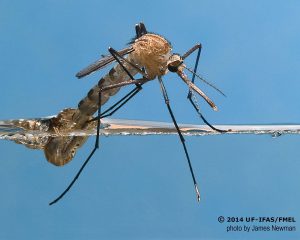ST. LUCIE COUNTY, Fla – Mosquito-borne viruses like West Nile and Eastern equine encephalitis pose a threat not only to humans, but also other animals. These viruses have caused disease and fatalities in birds, horses and wildlife. Captive orcas have been reportedly killed by mosquito-borne viruses, and there is evidence of infections found in wild Atlantic bottlenose dolphins. Now, Florida’s endangered manatees are the latest to be added to the vulnerable populations list.
A new study published in Scientific Report by Lawrence Reeves, an entomologist and research assistant scientist at the Florida Medical Entomology Lab of UF/IFAS in Vero Beach, provides the first records of mosquitoes biting West Indian manatees at Everglades National Park.

Reeves’ new research reports observations from the Flamingo Marina at the edge of the Florida Bay in Monroe County that represent the first documented interactions between mosquitoes and any marine mammal in nature. Reeves recorded cases of three mosquito species, Aedes, Anopheles, and Culex, interacting with the West Indian manatees. These species are known to carry West Nile virus, Eastern equine encephalitis virus, St. Louis encephalitis virus, and Venezuelan equine encephalitis virus.
“The observations show that these mosquitoes can locate and land on manatees at the surface of the water, and they can pierce manatee skin, probing around to find a blood vessel to feed from,” said Reeves. “In doing so, the mosquitoes introduce their saliva into the manatee, which, could infect the manatee with an arbovirus, if that mosquito is itself infected.”
Because mosquitoes only need to bite to infect an organism — not feed — this makes Reeves’ findings an important discovery for a species that is already threatened. West Indian manatees are protected in the United States under the Endangered Species Act and Marine Mammal Protection Act because of their decreasing population.
West Indian manatees prefer shallow, slow-moving waters of rivers, estuaries, saltwater bays, canals and coastal areas. In Florida, wild and captive manatees are frequently observed at the surface of the water, with their dorsal surface or snout exposed to the air for short periods of time, which makes them a target for these mosquitoes that call south Florida home. These behaviors make it easier for the mosquitos to locate and bite the manatees.
“Until this report came out, we knew that captive orcas in Texas and Florida have become infected by West Nile virus and St. Louis encephalitis virus, and some have died from the diseases,” said Reeves.
Reeves adds that mosquitoes have been observed biting the backs of captive orcas when they float on the surface. Meanwhile, wild Atlantic bottlenose dolphins from the Charleston, South Carolina area, and the Indian River Lagoon along the Treasure Coast have tested positive for antibodies to West Nile virus, Eastern equine encephalitis virus, St. Louis encephalitis virus, and Venezuelan equine encephalitis.
“This suggests that these mammals have somehow become infected with these viruses,” said Reeves. “We will be working in coastal ecosystems around the Indian River Lagoon over the next year, collecting blood fed mosquitoes to better understand their host associations.”
-30-
By: Lourdes Rodriguez, 954-577-6363 office, 954-242-8439 mobile, rodriguezl@ufl.edu
The mission of the University of Florida Institute of Food and Agricultural Sciences (UF/IFAS) is to develop knowledge relevant to agricultural, human, and natural resources and to make that knowledge available to sustain and enhance the quality of human life. With more than a dozen research facilities, 67 county Extension offices, and award-winning students and faculty in the UF College of Agricultural and Life Sciences, UF/IFAS brings science-based solutions to the state’s agricultural and natural resources industries and all Florida residents.
 1
1
